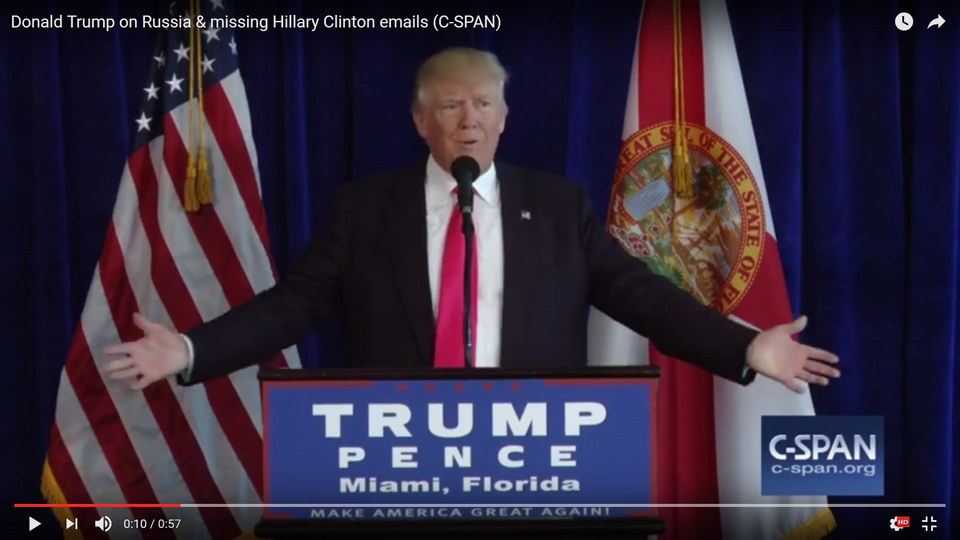From ‘treason’ to ‘criminal,’ experts decry Trump’s call for Russia hacks

Donald Trump’s ostensible call on Wednesday for foreign government workers to locate emails once on Hillary Clinton’s private server drew the immediate ire of security experts and political historians. They called his words an act of “treason” and “an assault on the Constitution,” among other things.
Speaking at a press conference, Trump, the Republican nominee for U.S. president, encouraged Russia to “find” and “release” 30,000 emails Clinton, his Democrat rival, sent or received while secretary of state.
“By the way, they hacked—they probably have her 33,000 emails,” Trump said. “I hope they do. They probably have her 33,000 emails that she lost and deleted because you’d see some beauties there. So let’s see.”
Trump made his comments during a morning press conference, and soon thereafter he doubled-down on the sentiment on Twitter.
If Russia or any other country or person has Hillary Clinton’s 33,000 illegally deleted emails, perhaps they should share them with the FBI!
— Donald J. Trump (@realDonaldTrump) July 27, 2016
Trump, who previously called on hackers to target President Obama’s college records, did not return requests for comment.
It’s unprecedented for a major party candidate to publicly advocate that a foreign government attack the United States in order to cause political damage against his or her opponent, says Jeremi Suri, a U.S. presidential historian and history professor at the University of Texas at Austin, who labeled the comments treason.
READ MORE ON ELECTION SECURITY
Parallax coverage of election security
“He’s actively encouraging one of our main foreign adversaries—an adversary that is threatening our soldiers and sailors and airmen abroad on a daily basis—encouraging that adversary to break into American secure facilities and documents,” Suri says.
Trump’s comments follow revelations six weeks ago that the Democratic National Committee computer systems suffered a cyberattack that lasted nearly a year and exposed research against Republican candidates, donor information, and emails. Cybersecurity experts and U.S. intelligence officials attributed the breach to Russia.
“If I did what Trump did today, I’d be investigated by the FBI.” — Richard Forno, director, Graduate Cybersecurity Program at the University of Maryland at Baltimore County
Prior to the Democratic National Convention held this week, some of the data was published on Wikileaks and led to the resignation of DNC Chairman Debbie Wasserman Schultz.
William Inboden, who served on the National Security Council during the George W. Bush administration and who also teaches at the University of Texas at Austin, agreed with Suri in comments made to Politico.
“Trump’s appeal for a foreign government hostile to the United States to manipulate our electoral process is not an assault on Hillary Clinton, it is an assault on the Constitution,” Inboden said.
Trump’s comments don’t change the state of the country’s cyberdefenses, says Richard Forno, director of the Graduate Cybersecurity Program at the University of Maryland at Baltimore County and a former cybersecurity contractor for the U.S. government.
“We’ll still be as vulnerable tomorrow as we are today,” he says, adding that the sorts of things that were limited to cyber war games are now regular occurrences. “Twenty years ago, [Trump] could’ve made a remark, but it was hypothetical. Now it’s real, and we see these attacks on a weekly basis. If I did what Trump did today, I’d be investigated by the FBI.”
At the very least, Trump’s comments disqualify him as a serious candidate, cybersecurity analyst Jeffrey Carr told Wired.
“Trump reaching out to Russia and China for help in obtaining hacked emails means that he has excluded himself from any serious international discussions about cybernorms,” he said. Even if Trump were asking Russia only to leak previously hacked emails, Carr said, “it’s still inappropriate and possibly illegal.”
